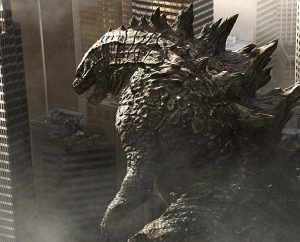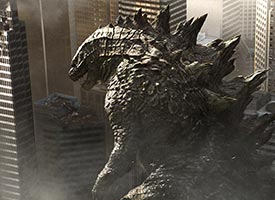(Rated PG-13; directed by Gareth Edwards; stars Aaron Taylor-Johnson, Elizabeth Olsen, Brian Cranston, Ken Watanabe, Sally Hawkins; run time: 123 minutes.)
In whom do you trust? A monster-sized question
By Ted Giese
Building on the original 1954 “Godzilla” and other early Godzilla films, director Gareth Edwards has made the Godzilla movie people wanted to see. He gives the audience a streamlined story that draws the human elements of the film into the foreground while simultaneously asking some deeper questions. “Godzilla” remains faithful to the look of the original film while effectively updating the source material for a modern audience.

The film tells the story of enormous, dormant, strange creatures who, through military and scientific agitation, become active — wreaking havoc wherever they go. Godzilla is one of these monsters. At one point in the film a media headline reads: “Godzilla King of the Monsters — Saviour of Our City?” (more on this below).
Aaron Taylor-Johnson, who plays Lieutenant Ford Brody, a naval explosive ordinance disposal officer and the human hero of the film, is just as much a “saviour” character as Godzilla. In fact, there are a number of points where director Edwards consciously links the monster and the human protagonists. In part, this provides a way “in” for the audience; Edwards is saying that the antlike human characters are not simply cannon fodder for Godzilla but are part of the equation. Having them as part of the equation becomes important once the sum of the film’s parts is added up.
There is one other important detail to consider as the deeper questions in “Godzilla” begin presenting themselves. Where the original 1954 film was born out of a specific fear of nuclear weapons, the current film includes an underlying fear of loss of technology, a fear of having to face nature on nature’s terms with no tools, no technology. The fear in “Godzilla” (2014) is not immediate death but rather a diminished quality of life. The monsters have the biologically induced effect of knocking out electrical power by their very presence, thereby effectively stripping humankind of its most prized advantages. Being stripped bare of the best technology reveals one of the big questions underpinning the film: What is man’s place in nature? The answer is left in the viewer’s hands and will be informed by his worldview.
In the film, Edwards presents two scientists with competing worldviews. These two characters help dig into some of these deeper questions. The first scientist, Joe Brody (Brian Cranston), the father of Ford Brody, is a nuclear power-plant engineer who suffered the loss of his wife in a sudden disaster. Joe Brody is suspicious of the official story of what happened, saying, “You’re not fooling anybody when you say that what happened was a ‘natural disaster.’ You’re lying! It was not an earthquake; it wasn’t a typhoon! Because what’s really happening is that you’re hiding something out there! And it is going to send us back to the Stone Age! God help us all ….” In his grief, Joe Brody introduces God into the equation.
The second scientist, Dr. Ishiro Serizawa (Ken Watanabe), long embroiled in the exploitation and cover-up of the monsters, reflects, “The arrogance of man is thinking nature is in our control and not the other way around.” At one point Dr. Serizawa’s assistant, Dr. Vivienne Graham (Sally Hawkins), says that Godzilla is “a god, for all intents and purposes.” Dr. Serizawa and his assistant subtract God from the equation.
Later, God comes back into the picture when a paratrooper prays before a dangerous jump into the path of Godzilla’s destruction. His prayer is personal and shows the conviction of his faith within his vocational duty as a soldier. He is not praying to Godzilla or to nature but to the Lord. This short scene presents a Christian worldview and is a significant point to consider, because it shows a confession of faith in which God is in control, not nature or man. This short prayer is a Godzilla-sized neon sign pointing to a traditional Christian order of creation: God is the Creator who makes and sustains all things; men and women are the pinnacle of creation; God gives them dominion over nature (Gen. 1:28). This worldview is in stark contrast to one in which there is no God and mankind lives at the whim of nature.
This brings us back to the film’s media report labeling Godzilla as “Godzilla King of the Monsters — Saviour of Our City?” Unlike the irrational gigantic beasts of last summer’s Pacific Rim (2013), Godzilla is shown as a defender of sorts. Under his scaly exterior there appears to be some kind of moral compass. This nod to a worldview that includes right and wrong potentially makes Godzilla into a Leviathan on a leash (Job 41:1-11). The question is, Who is holding the leash? A viewer’s belief in a Creator God has the potential to inform his outlook on “Godzilla.” God’s words to Job may come to mind: “Whatever is under the whole heaven is mine.” In the context of the film that would include Godzilla, Ford Brody, the paratrooper, even Dr. Serizawa and his assistant, Dr. Graham, and everyone and everything in the film.
Where movies like last year’s “Man of Steel” failed to deal with the human side of tragic disasters, “Godzilla” does a better job. From first responders, to school-bus drivers, to military personnel, to FEMA, people are shown working faithfully on behalf of others in need. The concrete nature of the film drives that point home in a unique and positive way. As in the recent film “World War Z,” there is also a positive depiction of a traditional family in which ultimately the family is strengthened — not broken — in the midst of trouble.
Overall “Godzilla” will be too intense for many young or sensitive viewers. However, in the middle of the spectacle that is “Godzilla,” viewers of every stripe will have an opportunity to ask where they place their trust — in God, in man or in nature?
The Rev. Ted Giese is associate pastor of Mount Olive Lutheran Church, Regina, Saskatchewan, Canada; a contributor to The Canadian Lutheran and Reporter; and movie reviewer for the “Issues, Etc.” radio program.
Posted May 22, 2014 / Updated May 23, 2014
